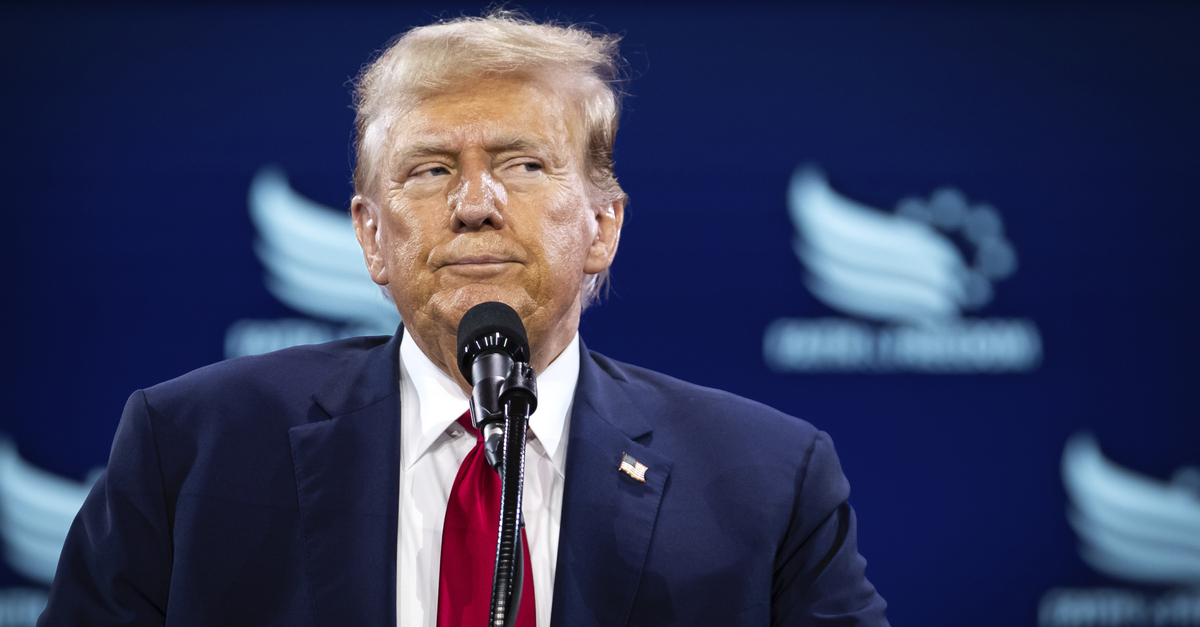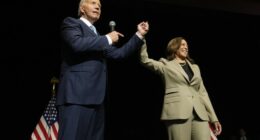
Donald Trump speaks at the annual Road to Majority conference in Washington, DC, June 22, 2024. (Allison Bailey/NurPhoto via AP)
The Trump administration on Thursday urged a federal court in Washington, D.C., to dismiss a lawsuit seeking to stop the government from implementing a policy that would freeze funding on distributions to federal aid programs, arguing that the plaintiff’s claims are moot because the White House Office of Management and Budget (OMB) rescinded the memo that was at the heart of the complaint.
The OMB memo, which was sent out Tuesday morning, stated the following (bold in original):
[T]o the extent permissible under applicable law, Federal agencies must temporarily pause all activities related to obligation or disbursement of all Federal financial assistance, and other relevant agency activities that may be implicated by the executive orders, including, but not limited to, financial assistance for foreign aid, nongovernmental organizations, DEI, woke gender ideology, and the green new deal.
The measure caused mass confusion throughout entities dependent on the federal government for funding. Multiple lawsuits were filed and U.S. District Judge Loren AliKhan on Wednesday issued an administrative stay temporarily stopping it from going into effect.
AliKhan’s order came in response to a lawsuit filed by the National Council of Nonprofits (NCN), the largest network of nonprofit organizations in North America.
The administration responded to the myriad legal actions by issuing a follow-up memorandum rescinding the prior one.
“OMB Memorandum M-25-13 is rescinded. If you have questions about implementing the President’s Executive Orders, please contact your agency General Counsel,” the second memo stated.
The rescission of the OMB memo, according to attorneys for the U.S. Department of Justice, means the federal court no longer has jurisdiction to hear the plaintiffs’ claims.
“Plaintiffs’ claims in this case are directed solely against the OMB Memo, which has now been withdrawn thereby rendering their claims moot,” Acting Assistant Attorney General Brett Shumate wrote in the 33-page filing. “And even prior to withdrawal, Plaintiffs have not established that the OMB Memo actually caused any harm redressable by an Order in this suit. Thus, this Court lacks Article III jurisdiction over their claims.”
However, a federal judge in Rhode Island this week also temporarily blocked the administration’s funding freeze, with his ruling coming after OMB rescinded the original memo.
During a hearing on Wednesday, U.S. District Judge John McConnell said that the White House sabotaged its own attempt to walk back the “hugely ambiguous” directives in the original memo, which meant the order was still subject to the court’s jurisdiction.
“I’m inclined to grant the restraining order,” McConnell reportedly said during the hearing. “I fear … that the administration is acting with a distinction without a difference.”
McConnell emphasized that White House press secretary Karoline Leavitt followed up the rescission memo with a social media post that seemed to only further muddy the waters as to the administration’s intentions by stating that the funding freeze was still in place.
“This is NOT a rescission of the federal funding freeze,” she wrote in a post to X, formerly Twitter. “It is simply a rescission of the OMB memo. Why? To end any confusion created by the court’s injunction. The President’s EO’s on federal funding remain in full force and effect, and will be rigorously implemented.”
The post was not enough to ameliorate McConnell’s concerns, as he reasoned that the potential harm envisioned by the plaintiffs in the case remained just as likely to occur.
“While the piece of paper may not exist, there’s sufficient evidence that the defendants collectively are acting consistent with that directive,” McConnell reportedly said, “and therefore the arguments that they have about needing a [restraining order] exist.”
The plaintiffs in the case before AliKhan argued that even with the withdrawal of the OMB memo, they have continued to suffer harm because the president’s executive orders are still in effect. However, the DOJ asserted that any such alleged harm is irrelevant due to the doctrine of separation of powers.
“Plaintiffs cannot expand their claims to seek relief against the President’s Executive Orders, which are not subject to challenge,” the filing states. “Over 150 years ago, the Supreme Court held that courts have ‘no jurisdiction … to enjoin the President in the performance of his official duties.””
Furthermore, the DOJ argued that the plaintiff’s claims should fail on the merits because the president and OMB may “lawfully direct agencies to implement the President’s agenda consistent with each agency’s governing authorities.”







